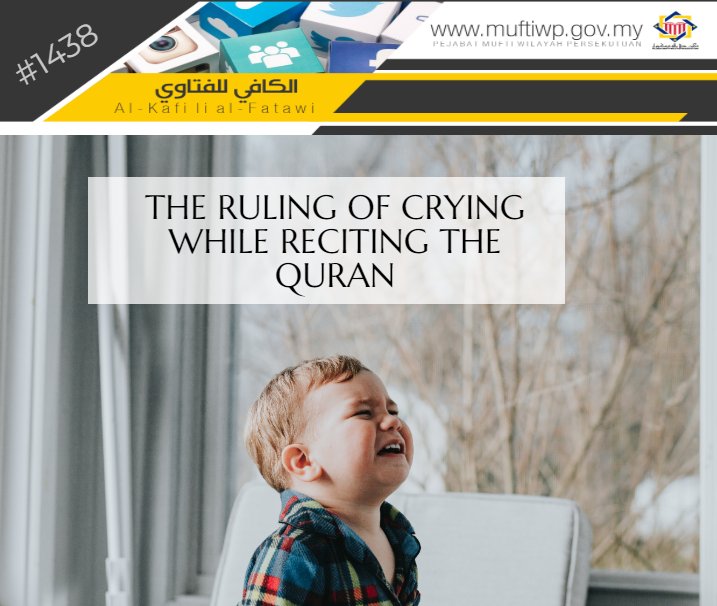Question:
Assalamualaikum SS Dato’ Seri Mufti. Can you explain the ruling of crying while reciting the Quran especially in prayer?
Answer:
Waalaikumussalam wbt,
Alhamdulillah, praise and thanks to Allah for the many countless blessings He has blessed us all with. Blessings and salutations to the Prophet Muhammad PBUH, his wives, his family, companions and all those that follow his teachings to the day of judgement.
Crying is a blessing given by Allah SWT in the hearts of His believers. It is the symbol of the purity of the soul, sincerity of heart and a god-fearing attribute of a slave for his Master.
In a hadith narrated by Anas bin Malik RA, he told a story when the son of the Prophet PBUH named Abraham passed away, the Prophet PBUH shed tears of sadness for his passing. Then, Abd Rahman bin Auf asked: “Even you would cry o Messenger of Allah?” The Prophet PBUH answered:
يَا ابْنَ عَوْفٍ إِنَّهَا رَحْمَةٌ
“O son of ‘Auf, indeed it (cry) is a blessing,”
Sahih al-Bukhari (1303)
Whereas the act of crying while reciting the Quran is an attribute of the salaf and the symbol of Allah SWT’s righteous slaves. There are evidences in syarak and athar of the salaf that proved this matter. In a hadith narrated by Sa’d bin Abu Waqqas RA, he said, the Prophet PBUH said:
إِنَّ هَذَا الْقُرْآنَ نَزَلَ بِحُزْنٍ فَإِذَا قَرَأْتُمُوهُ فَابْكُوا فَإِنْ لَمْ تَبْكُوا فَتَبَاكَوْا
“This Qur’an was revealed with sorrow, so when you recite it, then weep. If you cannot weep then pretend to weep,”
Sunan Ibn Majah (1337)
The same is stated in an athar which specifically state crying while reciting the Quran in prayer. This is stated by Abdullah bin Syaddad, he said:
سَمِعْتُ نَشِيجَ عُمَرَ بْنِ الْخَطَّابِ وَأَنَا فِي آخِرِ الصُّفُوفِ فِي صَلَاةِ الصُّبْحِ يَقْرَأُ مِنْ سُورَةِ يُوسُفَ قَالَ إِنَّمَا أَشْكُو بَثِّي وَحُزْنِي إِلَى اللهِ
“I heard Umar bin al-Khattab weeps when I was at the time in the last saf for Subuh prayer. At the time he was reciting a verse from surah Yusuf which is:
إِنَّمَا أَشْكُو بَثِّي وَحُزْنِي إِلَى اللهِ
"I only complain of my suffering and my grief to Allah,”
See Syu’ab Al-Iman, Al-Baihaqi (3/414).
Regarding the way to instil feeling sorrowful in the recitation of the Quran, the following we share the words of Imam al-Nawawi Rahimahullah: The way to get it (cry) is by feeling sad in one’s heart by contemplating what is written in the Quran from the warning to the harsh punishments. The same for (he remembers) the agreement (between himself and Allah SWT) and think hard on his misgivings and deficiency in the matter. If he is unable to feel sad and sorrow, like the al-Khawaas, then he should cry for his inability to do so for it is the greatest of disaster. Refer Al-Tibyan fi Adab Hamalat Al-Quran, Al-Nawawi (pg. 90).
He also cited the words of Hujjat al-Islam al-Ghazali Rahimahullah, who said: Crying is a commandment together with the recitation of the Quran as well as when the Quran is recited to him.
Conclusion
To conclude, we would like to state that it is permissible to cry while reciting the Quran. More so, it is commanded when a person is touched by the meaning of the recitation of the Quran, whether it is in prayer or outside of it, such as when one hears the verses regarding the punishments of hell and others.
However, it should be explained that in madhhab Syafi’e, if the cries result in the clear enunciation of two-letter, whether it has a meaning or otherwise, or one letter but it has a meaning such as “قِ” which means please protect, then the prayer is invalidated. If the enunciation is unclear, then the prayer is valid.
Lastly, may Allah SWT bless us with the right understanding in practising the religion. Amin.


